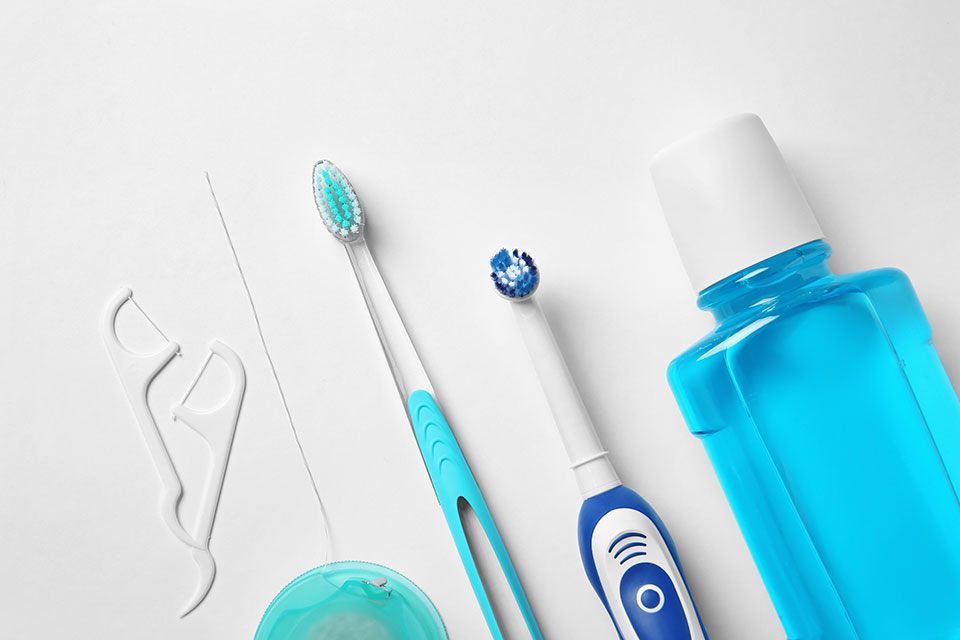Oral Hygiene Is Important With Dr. Kevin H. Gropp
Maintaining good oral hygiene is important not only for maintaining a healthy smile but also for your overall health. Poor oral hygiene can lead to a range of dental problems, from minor issues like bad breath and tooth decay to more severe issues such as gum disease and tooth loss. The American Dental Association (ADA) recommends choosing oral care products that have the ADA seal of approval, indicating they have undergone rigorous quality control and safety tests.
At Kevin H. Gropp, DDS, our Northridge, CA dentist wants our patients to understand why dental cleanings can prevent dental issues from arising and encourage proper oral hygiene practices. Contact our dental office today by calling (818) 709-8645 to schedule an appointment. We also proudly serve patients coming from Canoga Park, Reseda, Chatsworth, and the surrounding areas.

What Is Oral Hygiene?
Oral hygiene is the practice of keeping your mouth clean and free from disease. It involves regular brushing and flossing of your teeth, as well as routine visits to your dentist for check-ups and cleanings. Practicing good oral hygiene is crucial for maintaining overall health and preventing oral health problems such as tooth decay and gum disease. By maintaining good oral hygiene, you can help prevent issues like bad breath, yellow or brown teeth, and loose teeth, ensuring a healthy and confident smile.
How Does Poor Dental Hygiene Affect Your Oral Health?
Poor dental hygiene can have several effects on your oral health, including:
- Plaque and Tartar Build-Up: When you don’t brush and floss your teeth regularly, dental plaque, a harmful film of bacteria, accumulates on your teeth. Plaque can harden and turn into tartar, leading to tooth decay and periodontal disease.
- Tooth Decay: When bacteria in the plaque consume the sugars and carbohydrates from the food you eat, they produce acid that can erode the enamel, leading to cavities.
- Gum Disease: The build-up of plaque and tartar can cause inflammation of the gums, leading to gingivitis. If left untreated, gingivitis can progress to periodontitis, a more severe form of gum disease that can lead to tooth loss.
- Bad Breath: Poor oral hygiene can cause bad breath or halitosis, which can be embarrassing and affect your social life.
- Stained Teeth: When you consume certain foods and drinks, such as coffee, tea, and wine, the pigments in them can stain your teeth. Poor oral hygiene can make these stains worse by allowing them to accumulate over time.
Signs and Symptoms
The signs and symptoms of poor oral hygiene can vary, but common indicators include:
- Bad Breath (Halitosis): Persistent bad breath can be a sign of poor oral hygiene.
- Yellow or Brown Teeth: Discoloration of teeth can occur due to plaque buildup and poor brushing habits.
- Red, Swollen, or Bleeding Gums: These are often early signs of gum disease.
- Loose Teeth: Poor oral hygiene can weaken the structures supporting your teeth.
- Receding Gums: Gums that pull away from the teeth can indicate gum disease.
- Pain or Tenderness in the Mouth or Jaw: Discomfort can be a sign of underlying dental issues.
- Difficulty Chewing or Swallowing: This can result from various oral health problems.
- Visible Plaque or Tartar on Teeth: Plaque and tartar buildup are clear signs of poor oral hygiene.
- Changes in the Way Teeth Fit Together When Biting or Chewing: Misalignment can occur due to shifting teeth.
- Unusual or Persistent Pain in the Mouth or Jaw: Ongoing pain should be evaluated by a dentist.
Recognizing these signs and symptoms early can help you take action to improve your oral hygiene and prevent more serious health issues. If you notice any problems, contact our Northridge, CA, dental office today by calling (818) 709-8645 to schedule an appointment.
Dental Problems That Can Arise Due to Neglected Oral Hygiene and Gum Disease
If you don’t take care of your dental health well, you may experience the development of oral health problems.
Tooth Loss and Tooth Decay
Gum disease can lead to tooth loss if it’s not treated promptly. The bacteria in plaque and tartar can damage the gum tissue and bone that support your teeth, leading to tooth loss. Plaque hardening below the gum line can lead to gum disease and tooth loss. Tooth loss can have a significant impact on your ability to chew and speak, as well as affect your appearance. By properly practicing good oral hygiene habits, you can prevent tooth loss and costly dental treatments.
Tooth Sensitivity
When the protective enamel on your teeth wears away due to poor dental hygiene, the nerves inside your teeth can become exposed, leading to sensitivity to hot, cold, sweet, or acidic foods and drinks. This can make eating and drinking uncomfortable and affect your quality of life.
Abscessed Teeth
When tooth decay goes untreated, it can cause a bacterial infection in the tooth pulp, leading to an abscessed tooth. This can cause severe pain and swelling and even lead to tooth loss if left untreated.
Using fluoride toothpaste is crucial to prevent tooth decay and reduce the risk of abscessed teeth.
Oral Cancer
Poor oral hygiene can increase the risk of oral cancer. Oral cancer can affect the lips, tongue, cheeks, and throat, and if not detected early, can be life-threatening. Regular dental checkups can help detect oral cancer in its early stages when it’s most treatable. A registered dental hygienist plays a crucial role in the early detection and prevention of oral cancer.
Misaligned Bite or Jaw Problems
When teeth are lost due to poor oral hygiene, the remaining teeth can shift, leading to bite problems. Also, untreated infections and issues can potentially affect the jawbone. Specialty dental offices play a crucial role in providing specialized care for misaligned bite or jaw problems.
Oral Thrush
Oral thrush is a fungal infection that can occur when the balance of bacteria in the mouth is disrupted, often due to poor oral hygiene.
The Risks of Poor Oral Hygiene
Poor oral hygiene can lead to a range of serious health problems, including:
- Tooth Decay: Bacteria in the mouth break down sugars and carbohydrates, producing acid that can damage tooth enamel and lead to cavities.
- Gum Disease: Gingivitis and periodontitis are two types of gum disease that cause inflammation, infection, and damage to the gums and surrounding tissues.
- Heart Disease: Research has shown a potential link between gum disease and an increased risk of heart disease.
- Stroke: Similarly, gum disease has been associated with an increased risk of stroke.
- Diabetes: People with diabetes are more susceptible to oral health problems, and poor oral hygiene can exacerbate the condition.
- Respiratory Infections: Bacteria in the mouth can spread to the lungs, causing respiratory infections.
Maintaining good oral hygiene is essential for preventing these serious health issues and ensuring overall well-being.
Risk Factors
Certain factors can increase your risk of developing oral health problems, including:
- Poor Oral Hygiene Habits: Inconsistent brushing and flossing can lead to plaque buildup and dental issues.
- Genetics: Family history can play a role in your susceptibility to oral health problems.
- Smoking: Tobacco use is a significant risk factor for gum disease and oral cancer.
- Diabetes: This condition can make you more prone to infections, including those in the mouth.
- Respiratory Infections: Chronic respiratory issues can impact oral health.
- Heart Disease: Cardiovascular conditions can be linked to oral health problems.
- Osteoporosis: This bone-weakening disease can affect the jawbone and teeth.
- Certain Medications: Some medications reduce saliva flow, increasing the risk of dental issues.
Understanding these risk factors can help you take proactive steps to protect your oral health.
Who Is at Risk?
Certain groups of people are more at risk of developing oral health problems, including:
- Smokers: Tobacco use significantly increases the risk of gum disease and oral cancer.
- People with Diabetes: This condition makes individuals more susceptible to infections, including those in the mouth.
- People with Respiratory Infections: Chronic respiratory issues can impact oral health.
- People with Heart Disease: Cardiovascular conditions can be linked to oral health problems.
- People with Osteoporosis: This bone-weakening disease can affect the jawbone and teeth.
- People Who Are Pregnant or Breastfeeding: Hormonal changes can impact oral health.
- People with a Family History of Oral Health Problems: Genetics can play a role in susceptibility to dental issues.
If you fall into any of these categories, it’s especially important to practice good oral hygiene and visit your dentist regularly to maintain optimal oral health.
The Benefits of Dental Cleanings
Dental cleanings are an essential part of maintaining good oral health. Regular cleanings can help remove plaque and tartar buildup, preventing tooth decay and gum disease. A dental hygienist performs these cleanings, effectively removing tartar that cannot be eliminated through regular brushing and flossing, thus maintaining overall oral health.
 Other benefits of dental cleanings include:
Other benefits of dental cleanings include:
- Fresh Breath: Dental cleanings can help eliminate bad breath, leaving your mouth feeling fresh and clean.
- Early Detection of Dental Problems: Regular dental checkups can help detect dental problems early, preventing them from becoming more severe.
- Improved Overall Health: Poor oral health has been linked to several health problems, including heart disease, diabetes, and stroke. Regular dental cleanings can help improve your overall health by reducing the risk of these conditions.
Frequently Asked Questions
Can poor oral hygiene cause heart disease?
There’s evidence to suggest that poor oral hygiene and gum disease may contribute to an increased risk of heart disease. The bacteria that cause gum disease can enter the bloodstream and cause inflammation in the heart and blood vessels. Maintaining good oral hygiene may help reduce the risk of heart disease.
Can poor oral hygiene affect my overall health?
Yes, poor oral hygiene can affect your overall health. Oral bacteria can enter the bloodstream through gum tissues, potentially causing inflammation and infections in other parts of the body. Research has linked poor oral health to various health issues, such as heart disease, stroke, diabetes, respiratory problems, and pregnancy complications.
Can I improve my oral health by brushing and flossing regularly?
Yes, brushing and using dental floss regularly can help improve your oral health by removing plaque between teeth and preventing tooth decay and gum disease. However, we also recommend visiting your dentist twice a year for dental checkups and cleanings to ensure your oral health is in good condition.
Our Northridge Dentist Can Help You Achieve Excellent Oral Health
Poor oral hygiene can harm your oral health and overall well-being. However, with regular dental checkups, cleanings, and good oral hygiene practices, you can maintain good oral health and prevent future dental problems.
Schedule your appointment with our Northridge dentist today to get your oral health on track. We also proudly serve patients coming from Canoga Park, Reseda, Chatsworth, and the surrounding areas.

